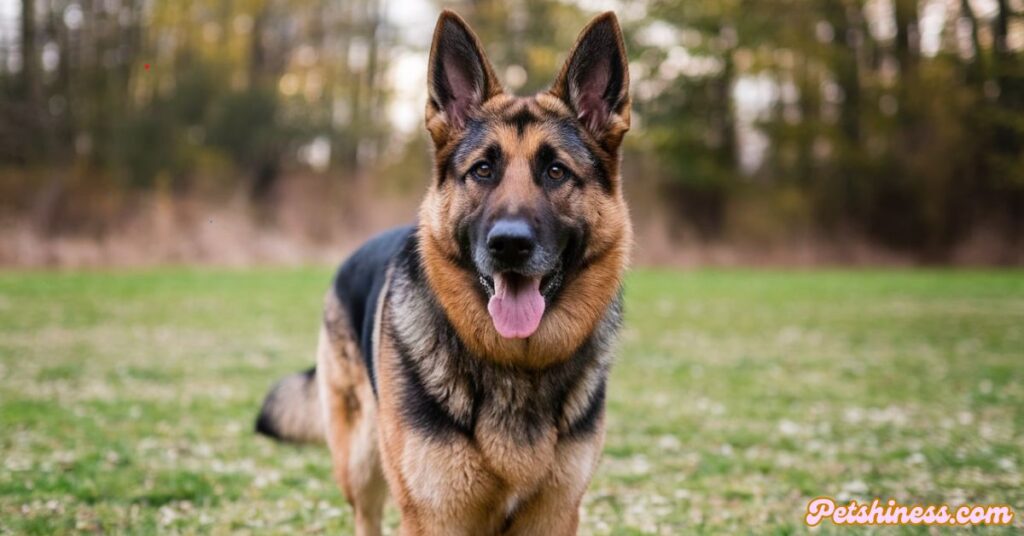Feeding German Shepherds properly means giving them food that meets their unique nutritional needs. This includes high protein, healthy fats, and essential vitamins. The right food helps them grow strong and stay healthy. Bad food can harm their health and energy.
Choosing the best food for your German Shepherd can feel confusing. There are so many brands and options. Some foods help them thrive, while others might cause allergies or stomach issues. Keep reading to find out what works best and what to avoid.
The best dog food for German Shepherds is made with quality ingredients. It supports their muscles, bones, and coat health. Knowing the worst foods is just as important to keep them safe and healthy. This guide will help you make the best choices.
What Is the Best Food to Feed German Shepherds?
Feeding your German Shepherd a diet rich in protein, healthy fats, and essential nutrients is crucial for their overall health and energy. A high-quality diet keeps their muscles strong, coats shiny, and energy levels high. Look for dog foods with real meat (like chicken, beef, or lamb) as the first ingredient, along with whole grains or grain-free alternatives, depending on your dog’s needs.
Premium dog food brands such as Origen, Hill’s Science Diet, and Royal Canin are often recommended by vets for German Shepherds. These brands focus on complete and balanced nutrition, avoiding fillers like corn or soy. Below is a table summarizing the key components of the best food for German Shepherds and top brand recommendations.
Key Nutritional Needs and Recommended Foods for German Shepherds
| Nutritional Component | Importance for German Shepherds | Examples of Top Dog Food Brands |
| Protein (18%-22%) | Builds muscle, supports energy | Orijen Original, Blue Buffalo Wilderness |
| Healthy Fats (10%-15%) | Keeps coat shiny, supports brain health | Royal Canin German Shepherd Formula |
| Omega-3 and Omega-6 | Reduces inflammation, boosts skin health | Hill’s Science Diet Sensitive Skin |
| Carbohydrates | Provides energy | Sweet potatoes, brown rice |
| Calcium and Phosphorus | Strengthens bones | Wellness Complete Health Large Breed Puppy |
| Probiotics | Aids digestion | Purina Pro Plan Sensitive Skin & Stomach |
Tips for Feeding German Shepherds
- Choose Large-Breed Formulas: German Shepherds are large dogs and need specific nutrients to protect their joints.
- Avoid Fillers and Artificial Additives: These provide no nutritional value and can trigger allergies.
- Monitor Portion Sizes: Overfeeding can lead to obesity, so feed according to your dog’s weight and activity level.
By focusing on high-quality ingredients and balanced meals, your German Shepherd can enjoy a healthy and happy life.
Should German Shepherds Eat Grain-Free Food?

Grain-free food can be an excellent option for German Shepherds with sensitivities or allergies. Some dogs are prone to digestive issues or itchy skin when eating grains like corn or wheat. Grain-free diets use alternatives such as peas, lentils, or potatoes for carbohydrates, which are easier on their stomachs.
However, grain-free isn’t always necessary. Studies have shown that grain-free diets could be linked to heart conditions in some dogs, so consult your vet before switching. A balanced approach works best: if your dog thrives on grains, there’s no need to eliminate them. Focus on high-quality ingredients instead.
What Not to Give a German Shepherd
Certain foods and ingredients can harm German Shepherds. Chocolate, grapes, onions, and garlic are toxic and should never be given to dogs. Bones, especially cooked ones, can splinter and damage their digestive system.
Additionally, avoid feeding your dog processed foods with artificial colors, preservatives, and by-products. These low-quality ingredients can cause health problems like allergies, obesity, and digestive issues over time. Stick to natural treats and safe options, like carrots, apples, or pumpkin, to keep them healthy.
Is Blue Buffalo Good for German Shepherds?
Blue Buffalo is a trusted brand that often uses high-quality ingredients in its formulas. Their recipes prioritize real meat, vegetables, and grains or grain-free alternatives, making them a good choice for many German Shepherds.
However, some dogs might develop digestive issues with certain Blue Buffalo recipes. If you decide to try it, start with small portions and monitor your dog for signs of discomfort. Overall, it’s a solid option, but always consider your dog’s unique preferences and sensitivities.
Worst Dog Food for German Shepherds
Low-quality dog food can harm your German Shepherd’s health in the long run. Foods loaded with fillers like corn or soy, artificial preservatives, and by-products provide little to no nutritional value. They may lead to allergies, weight gain, and other health issues.
Examples of Harmful Ingredients to Avoid:
- Corn and wheat: Cheap fillers that lack nutrients and may cause allergies.
- BHA/BHT: Artificial preservatives linked to health risks.
- Meat by-products: Poor-quality protein sources that are hard to digest.
Feeding your dog food with these ingredients can result in a dull coat, digestive troubles, and lack of energy. Always check the label and opt for brands that use premium ingredients.
Best Dog Food for German Shepherd Puppies
Puppies grow quickly, so they need a diet rich in protein, calcium, and healthy fats. Puppy food is specially designed to meet their developmental needs, ensuring they build strong bones and muscles.
Brands like Royal Canin Puppy Formula and Wellness Complete Health Puppy are excellent choices. They provide balanced nutrition with DHA for brain development and omega-3s for a shiny coat. Feed your puppy small, frequent meals throughout the day to keep their energy levels stable.
Best Dog Food for German Shepherd Adults
Once your German Shepherd reaches adulthood, their dietary needs change. Adult dogs require balanced nutrition to maintain their muscle mass and energy levels without overeating.
Dry kibble is the best option for adults, as it promotes good dental health while providing essential nutrients. Brands like Victor Hi-Pro Plus Dry Food and Eucapnia Breed-Specific German Shepherd Formula are great for adult dogs. Ensure portion sizes match your dog’s weight and activity level to avoid obesity.
Best and Worst Food Choices for German Shepherds: Benefits and Risks Explained

In this section, we’ll explore the best and worst food choices for German Shepherds, highlighting the benefits of good food and the risks of feeding them harmful ingredients. By using a clear table, you’ll easily see which foods are great for your dog’s health and which ones should be avoided.
Table: Benefits and Risks of Different Foods for German Shepherds
| Food Type | Benefits | Risks/Drawbacks |
|---|---|---|
| High-Protein Foods (Chicken, Beef) | Supports muscle growth, boosts energy levels, and keeps coats shiny | Can cause weight gain if overfed, might trigger allergies in some dogs |
| Omega-3 Fatty Acids (Salmon, Fish Oils) | Reduces inflammation, improves coat health, supports brain function | May cause stomach upset if given in excess |
| Whole Grains (Brown Rice, Oats) | Good source of energy, aids in digestion, rich in fiber | Can cause allergies or digestive issues in sensitive dogs |
| Grain-Free Foods | Suitable for dogs with grain allergies, supports healthy digestion | May lack necessary fiber, some grain-free formulas contain more fat |
| Fillers (Corn, Soy) | Cheap ingredients, adds volume to food | Can cause allergies, digestive problems, and weight gain |
| Artificial Additives (Colors, Preservatives) | Enhance food appearance and shelf life | Can cause allergic reactions and long-term health issues like kidney damage |
By knowing the benefits and risks of different food types, you can make more informed decisions about your German Shepherd’s diet.
Best Dog Food for German Shepherds With Skin Allergies
If your dog suffers from itchy skin or a dull coat, switching to hypoallergenic food might help. Foods with limited ingredients and free of common allergens can soothe skin problems and improve coat health.
Choose options like Hill’s Science Diet Sensitive Skin and Stomach or Natural Balance Limited Ingredient Diets. These foods often include fish, which is rich in omega-3 fatty acids, helping reduce inflammation and promote healthy skin.
FAQs
Can German Shepherds eat raw food?
Yes, they can, but it must be balanced. Include raw meat, bones, and vegetables to meet nutritional needs. Always consult a vet before starting.
How much food should I give my German Shepherd?
For adults, feed about 2-3 cups of dry food daily, depending on their weight and activity. Puppies need more frequent meals.
Can German Shepherds eat human food?
Some human foods, like cooked chicken or plain rice, are safe. However, avoid toxic foods like chocolate, onions, and garlic.
What’s better, wet or dry food?
Dry food is better for dental health, but wet food can be added occasionally for variety and hydration.
How do I know if my dog is allergic to food?
Watch for signs like excessive scratching, vomiting, or loose stools. A vet can confirm food allergies through tests.
Conclusion
feeding your German Shepherd the right food is crucial for their health and well-being. Choosing high-quality food with the right balance of protein, fats, and essential nutrients helps them live a long, active life. Be mindful of ingredients and avoid foods with fillers or artificial additives that could harm their digestive health.
By following this guide and considering your dog’s specific needs, you can ensure they get the best nutrition possible. Remember to consult your vet for advice tailored to your dog’s health requirements. With the right food, your German Shepherd will be happy, healthy, and full of energy.
Read Also :
Scorpion Names With Meanings
Comprehensive Care Guide for Panda Cory (Panda Catfish)
Appaloosa Horse Names

Jerry John ensures petshiness.com runs smoothly and securely. With a passion for tech and a focus on user experience, Jerry manages the site to deliver top-notch content and functionality.











